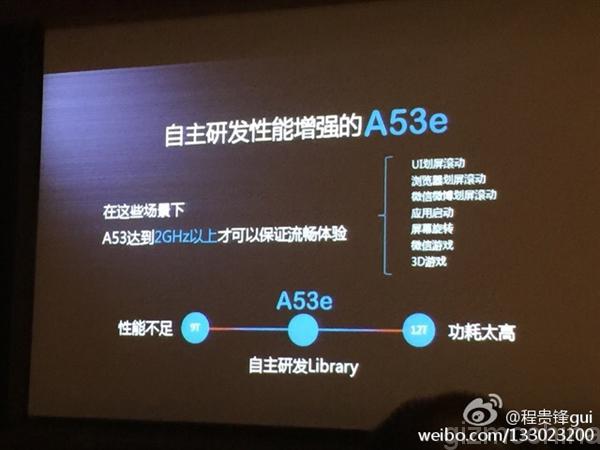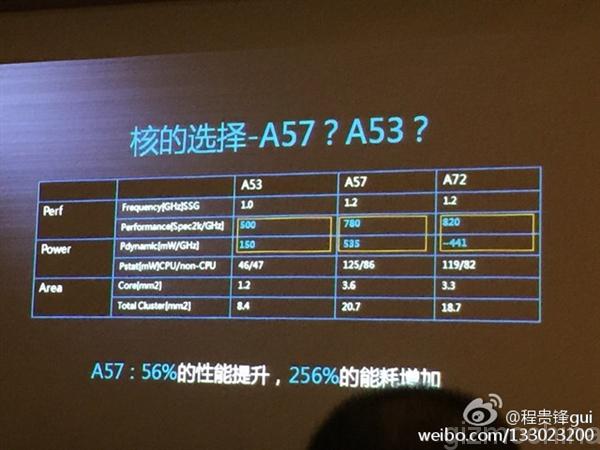Huawei Kirin 930 Chip Uses High Frequency Cortex-A53 For High-End Performance
Huawei recently announced a new SoC called the Kirin 930. The chip is built on TSMC's 16 nm FinFET process node, which puts it ahead of many other chip companies, including Qualcomm, in terms of adopting a more cutting edge process.
Being on a next-generation process node means that the chip can be made either more powerful, more efficient, or a combination of both. A chip company can even use the process advantage to hide the lower architectural performance of its CPU if it can raise the clock speed enough to reach the same performance as a competitor's chip, while still maintaining a certain power consumption level.
Apparently, Huawei chose to take advantage of the new process node by raising the speed of Cortex-A53 cores to 2 GHz and then calling them Cortex-A53 enhanced, or Cortex-A53e (likely just a brand name for a high clock speed Cortex-A53).
The Kirin 930 SoC comes with eight CPU cores, of which four are Cortex-A53 and clocked at 1.2 GHz, and the other four are the Cortex-A53e cores. The latter are supposed to replace the higher-performance Cortex-A57 cores we have seen in octa-core chips so far.
According to Huawei's benchmarks, a Cortex-A57 core is "only" 56 percent faster than a Cortex-A53 core, but at the same time, the Cortex-A57 core uses 3.5 times more power per GHz than the Cortex-A53 core (535mW/GHz vs 150mW/GHz).
In Huawei's opinion the trade-off is not worth it, and the company would rather use Cortex-A53 cores that have the same clock speed but use 3.5 times less energy, even if a Cortex-A57 core is 56 percent faster.
With the move to lower-power Cortex-A53 cores for high-end performance, Huawei manages to shoot two birds with one stone, because Cortex-A53 cores also cost less to make, which allows the company to beat competitors on price and offer better value for the money.
Get Tom's Hardware's best news and in-depth reviews, straight to your inbox.
Huawei also seems to value making very slim phones, and using smaller and low-power chips that don't heat up too fast seems like a good idea for this purpose.
One of the first devices to use the new Kirin 930 SoC will be the Huawei P8 smartphone, for which the company is planning on holding an event on April 15, 2015 in London.
Follow us @tomshardware, on Facebook and on Google+.
Lucian Armasu is a Contributing Writer for Tom's Hardware US. He covers software news and the issues surrounding privacy and security.
-
JeffroGymnast I find it intriguing that they relate power to frequency linearly....Reply
Surely by the time you clock an A53 to over 2 GHz it uses more power per GHz than when it's at 1.2... -
PEJUman ReplyI find it intriguing that they relate power to frequency linearly....
Surely by the time you clock an A53 to over 2 GHz it uses more power per GHz than when it's at 1.2...
I think the idea was to leverage the 16nm process to compensate for the increased power/Ghz for 53e.
i.e. they are comparing 2 Ghz, 53e@16nm vs. 2Ghz, 57@20nm, and found the power/Ghz is significantly better with 53e. -
aldaia ReplyI find it intriguing that they relate power to frequency linearly....
Surely by the time you clock an A53 to over 2 GHz it uses more power per GHz than when it's at 1.2...
Nothing intriguing at all. It is well known that power consumption of a processor is proportional to C*V^2*F where C is the equivalent capacity of the circuit, V the voltage and F the the frequency. So, as long as the voltage is kept constant, power scales linearly with frequency. Of course if voltage needs to be raised then bad thinga happen, since power grows proportional to the square of the voltage.
-
JeffroGymnast They'd be throwing power consuption out the window if they were to run the cpu with more voltage than necessary... And a doubling of frequency is definitely going to require considerably more voltage, all else held constant.Reply
15570302 said:I find it intriguing that they relate power to frequency linearly....
Surely by the time you clock an A53 to over 2 GHz it uses more power per GHz than when it's at 1.2...
Nothing intriguing at all. It is well known that power consumption of a processor is proportional to C*V^2*F where C is the equivalent capacity of the circuit, V the voltage and F the the frequency. So, as long as the voltage is kept constant, power scales linearly with frequency. Of course if voltage needs to be raised then bad thinga happen, since power grows proportional to the square of the voltage.
-
jrharbort The typical 'top speed' of the A53 core on 20nm is 1.7GHz (you often see 4@1.2GHz x 4@1.7GHz A53 cpu configurations). So the slight bump to 2GHz using 16nm is not that drastic. This was actually a nice idea for cost, performance and power ratios.Reply

